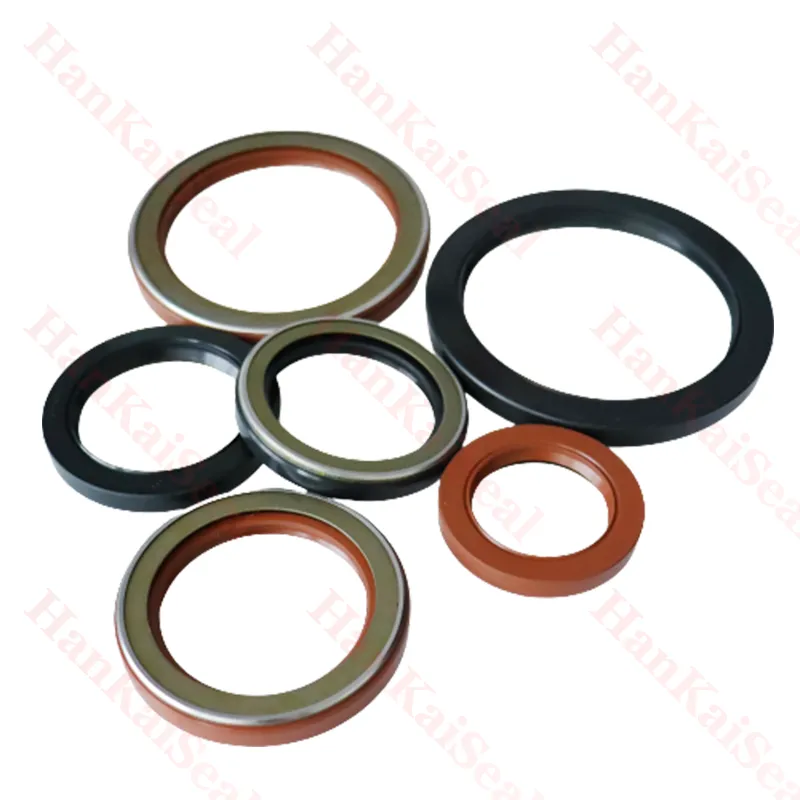ኅዳር . 10, 2024 14:07 Back to list
Hydraulic Cylinder Seals for Optimal Performance and Durability in Fluid Systems
Understanding Hydraulic Cylinder Oil Seals
Hydraulic cylinders play a crucial role in various industrial applications, serving as the driving force in machinery ranging from construction equipment to manufacturing processes. At the heart of these hydraulic systems lies a vital component known as the oil seal. Oil seals are essential for maintaining hydraulic fluid containment, ensuring optimal performance and longevity of hydraulic cylinders. This article explores the importance of hydraulic cylinder oil seals, their design, and the factors that affect their performance.
What are Hydraulic Cylinder Oil Seals?
Oil seals, also referred to as hydraulic seals, are specially designed components that prevent the leakage of hydraulic fluid from the cylinder while also keeping contaminants such as dirt, dust, and moisture from entering the hydraulic system. Typically made from durable materials like rubber or polyurethane, these seals are designed to withstand high pressures and extreme temperatures. The proper selection and installation of oil seals are critical for the efficient operation of hydraulic systems.
Importance of Oil Seals in Hydraulic Cylinders
1. Fluid Containment The primary role of oil seals is to ensure that hydraulic fluid remains within the cylinder. Loss of fluid due to seal failure can lead to decreased efficiency, reduced performance, and potential system failure.
2. Contamination Prevention Hydraulic systems are vulnerable to contaminants that can cause damage to internal components. Oil seals act as a barrier to prevent dirt and moisture from entering, which helps maintain the integrity and cleanliness of the hydraulic fluid.
3. Enhanced Performance By maintaining the proper pressure within the hydraulic system, oil seals contribute to the overall performance of hydraulic cylinders. This ensures smooth operation, increases responsiveness, and prolongs the life of the machine.
4. Cost Efficiency The use of effective oil seals minimizes the risk of leaks and contamination, leading to reduced maintenance costs and downtime. In the long run, this translates to greater productivity and efficiency within industrial operations.
Design and Types of Hydraulic Cylinder Oil Seals
Hydraulic cylinder oil seals come in various types and designs to suit different applications. Some common types include
1. U-Cups These seals are shaped like a U and are commonly used in dynamic applications. Their design helps them retain their sealing effectiveness even under varying pressure conditions.
hydraulic cylinder oil seal

2. O-Rings O-rings are circular seals that provide a reliable barrier against hydraulic fluids. They are often used in static applications and can be combined with other seal types for enhanced sealing performance.
3. Lip Seals Lip seals have a flexible lip that presses against a smooth surface, providing a tight seal. They are effective for both dynamic and static sealing applications and are widely used in hydraulic cylinders.
4. Composite Seals Composite seals combine different materials to optimize performance. For example, a combination of rubber with a metal structure can provide enhanced durability and resistance to wear.
Factors Affecting Oil Seal Performance
Several factors influence the effectiveness and longevity of hydraulic cylinder oil seals
1. Material Selection The material used for the seal must be compatible with the hydraulic fluid and the operating conditions. Factors such as temperature, pressure, and chemical compatibility should be taken into account.
2. Installation Proper installation is critical for seal performance. An incorrectly installed seal can lead to premature wear and leakage. Following manufacturer guidelines and best practices is essential during installation.
3. Operating Conditions Extreme temperatures, high pressures, and exposure to harsh chemicals can accelerate wear and tear on oil seals. Understanding the operating environment is vital for selecting the right seal.
4. Regular Maintenance Periodic inspection and maintenance of hydraulic systems can help identify potential seal failures early. Keeping hydraulic systems clean and well-lubricated can significantly extend the life of oil seals.
Conclusion
Hydraulic cylinder oil seals may seem like small components, but they are vital to the overall performance and reliability of hydraulic systems. By understanding their importance, selecting the right type, and implementing best practices for installation and maintenance, operators can ensure the longevity and efficiency of their hydraulic machinery. Investing in high-quality oil seals and regularly maintaining hydraulic systems will lead to smoother operations and significant cost savings in the long run.
-
TCN Oil Seal Metal Ring Reinforcement for Heavy Machinery
NewsJul.25,2025
-
Rotary Lip Seal Spring-Loaded Design for High-Speed Applications
NewsJul.25,2025
-
Hydraulic Cylinder Seals Polyurethane Material for High-Impact Jobs
NewsJul.25,2025
-
High Pressure Oil Seal Polyurethane Coating Wear Resistance
NewsJul.25,2025
-
Dust Proof Seal Double Lip Design for Construction Equipment
NewsJul.25,2025
-
Hub Seal Polyurethane Wear Resistance in Agricultural Vehicles
NewsJul.25,2025
-
The Trans-formative Journey of Wheel Hub Oil Seals
NewsJun.06,2025
Products categories
















